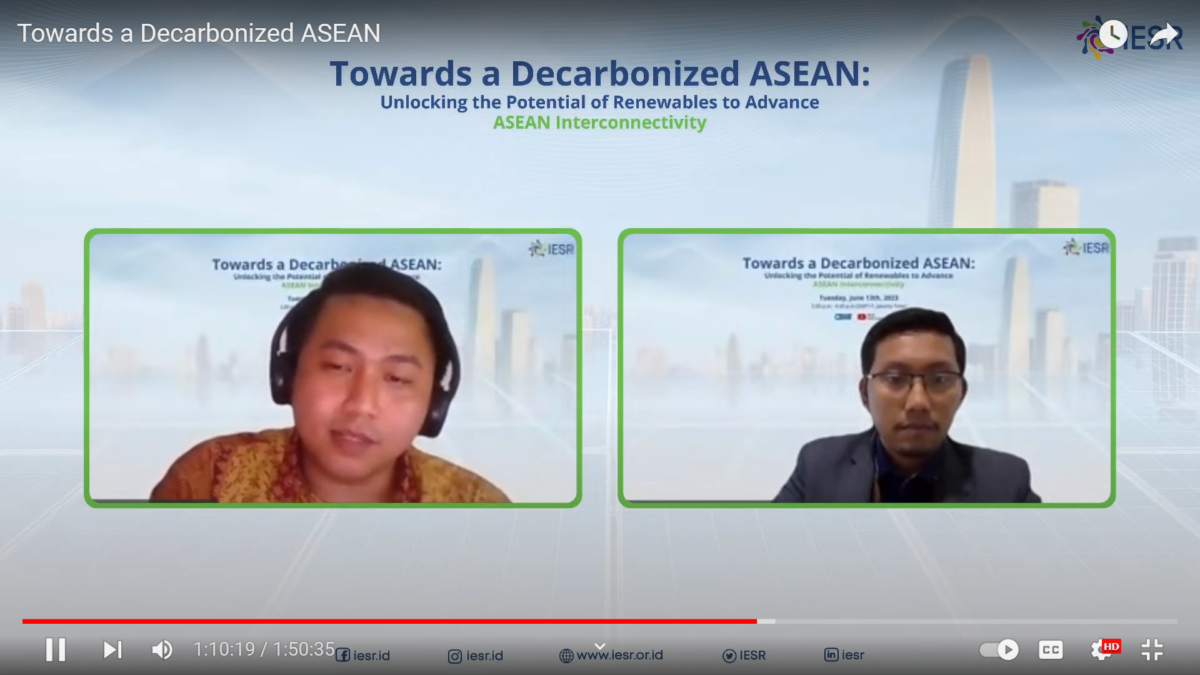Jakarta, 13 June 2023 – Southeast Asia is a region with the largest economic growth and energy demand. Economic growth followed by increase in energy demand in the region is projected to continue in the coming years. If the use of environmentally friendly energy sources is not anticipated, this economic growth and energy demand will become the main problem of increasing greenhouse gas (GHG) emissions in the ASEAN region.
In a webinar titled Towards a Decarbonized ASEAN: Unlocking the Potential of Renewables to Advance ASEAN Interconnectivity Fabby Tumiwa, Executive Director of the Institute for Essential Services Reform stated that ASEAN has the opportunity to encourage the creation of a renewable energy industry ecosystem through the cooperation of the ASEAN Power Grid (APG) regional interconnection network.
“ASEAN power grid can be one of the supporting infrastructures to accelerate the use of renewable energy in ASEAN countries while waiting for its market share to grow. ASEAN countries can encourage supply chain cooperation in renewable energy technology, especially solar module cell technology,” he said.
Fabby added that Indonesia, as the holder of the ASEAN Chair this year, has the opportunity to encourage this initiative and encourage the transition of fossil fuel-based industries towards renewable energy. A greener industrial transformation is believed to have a multiplier effect in the form of creating green jobs in the future.
In line with Fabby, Yeni Gusrini, Sub Coordinator of the Gatrik Program at the Ministry of Energy and Mineral Resources stated that in the first phase of development, the ASEAN Power Grid had succeeded in transferring 100 MW of electricity from Lao PDR to Singapore.
“The first phase of APG development succeeded in connecting Lao PDR – Thailand – Malaysia – Singapore. Moreover, APG will be a contributor to economic growth that ensures sufficient energy throughout the ASEAN region,” added Yeni.
Indra Overland, Head of Center for Energy Research, Norwegian Institute of International Affairs, said it is important for ASEAN countries to start thinking about strategies to increase renewable energy in the country and in the region.
“We can take as an example Vietnam which has succeeded in massively adding its renewable energy capacity in the past decade. Strategies such as having a policy framework that supports the development of renewable energy including taxation and ease of licensing are very influential for investors’ interest in investing in the development of renewable energy in an area,” he said.
Added by Overland, one indicator of a country having good policy implementation is when the renewable energy sector has abundant investors.
Zulfikar Yurnaidi, Energy Modeling and Policy Planning Manager, ASEAN Center for Energy, acknowledged that the financial factor which is one of the inhibiting factors for renewable energy penetration in the network. He said that one of the focuses of ASEAN 2021 – 2025 is to build connectivity and integrate regional markets.
“Penetration of renewable energy must be translated into the addition of generation capacity. To support this, network modernization must be carried out to maintain network stability, flexibility, and toughness. All of this requires a large amount of investment, and the government’s current budget is insufficient to finance everything, so the role of private investors is needed here,” Zulfikar explained.
The existence of the ASEAN Power Grid will bring long-lasting socio-economic impacts. The hope is that the traded electricity is clean electricity produced by renewable energy generators. So, this clearly affects the location of fossil power plants which are still quite a lot in the ASEAN region.
Ahmad Ashov Birry, Program Director of Trend Asia, gave an example that Indonesia still has a pile of homework related to this fossil power plant. Starting from an early retirement plan for fossil-based power plants to the construction of new renewable energy-based power plants.
“In this series of processes (ending fossil-based plants and construction of new power plants based on renewable energy, ed), the community needs to be involved, so that they can anticipate the possible damage arising from each stage. So that the transition (energy, ed) that occurs is (transition, ed) that is just, and makes life prosperous,” he explained.

